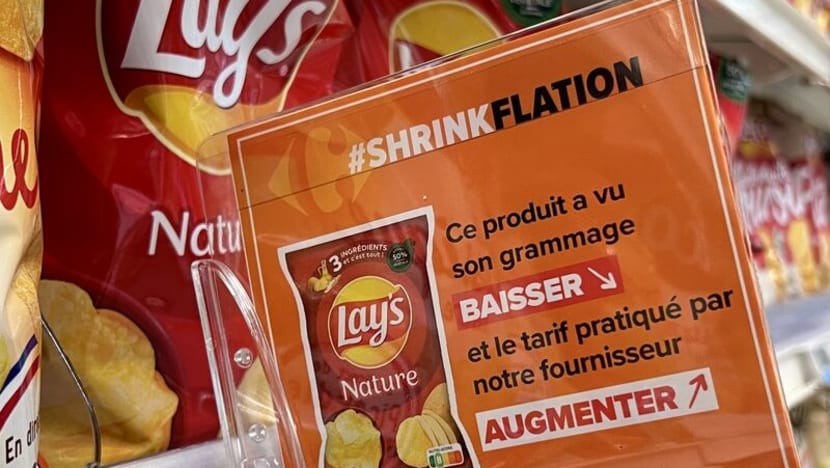Commentary: In a time of shrinkflation, how will consumers’ elasticity of forgiveness hold up?
In the world of shrinkflation, where product sizes mysteriously shrink while prices stay put, how much can consumers forgive before they walk away? Accenture Song’s Growth Markets president Flaviano Faleiro weighs in.

A sign in a French Carrefour store reads: "Shrinkflation. This product has seen its weight decrease and the price charged by our supplier increase." (Photo: Linkedin/Carrefour)

This audio is generated by an AI tool.
SINGAPORE: Have you noticed food portions becoming smaller when dining out? Or that your bag of chips has fewer crisps despite remaining at the same price?
Shrinkflation, where brands reduce product sizes while keeping prices the same, has become the not-so-secret weapon in the battle against rising costs. The practice is certainly not new, but it’s becoming more apparent. Enter the concept of "elasticity of forgiveness" - a fancy way of asking, "Hey, brands, how much can we take before we walk away?"
Carrefour in France has taken a bold stand, putting up posters and labels on items from soft drinks to chocolate and infant formula to warn consumers about shrinkflation. The aim in highlighting those products, Carrefour’s director of client communications was reported as saying, was to get manufacturers to rethink their pricing policy.
Across the Channel, consumers in the United Kingdom have also noticed differences in their products, with the volume of alcohol in some beverages dropping to 41.3 per cent from 43.1 per cent, bagels sporting larger holes, smaller soap bars and more.
Shrinkflation challenges the delicate balance between businesses' pursuit of profit margins and meeting the expectations of their customer base. The crux of the matter lies in understanding how much consumers are willing to forgive or overlook these adjustments.
Against a challenging economic backdrop, businesses are cutting costs to protect profits. But what they see as survival tactics, consumers perceive as greed.
Almost a third (31 per cent) of consumers in the Asia-Pacific surveyed by Accenture Song think businesses prioritise higher profits over better customer experience. The survey, conducted in August 2023, polled 5,590 consumers in eight countries in the Asia-Pacific.
We've come from a decade where businesses pampered us with quick delivery and personalisation. Now, customers expect relationships with businesses to extend beyond mere transactions.
A PERCEPTION PROBLEM
The challenge with shrinkflation lies in overcoming the perception problem. Businesses do what they must to remain economically viable, but customers do not see the challenges they face behind the scenes. If brands continue to offer customers less for more, resentment will quickly build, jeopardising long-term business growth.
Building an elasticity of forgiveness involves cultivating loyalty so strong that customers can look beyond the price tag and recognise the value businesses still deliver when making tough decisions in this era of shrinkflation.
The real deal is the emotional connection we have with our favourite brands. Can we overlook the shrinking snacks because we love the brand so much? Or will we flip the script, become super-sleuth shoppers, and demand more bang for our buck?
Importantly, a deep understanding of consumers’ shopping behaviour helps. In a scenario where consumers exhibit heightened price sensitivity and tight grocery budgets, a company's strong brand recognition and commitment to aiding consumers in attaining an economical shopping basket can lead to increased sales and help retain customers looking to stretch their dollar.
Take Coca-Cola for example. To cater to the budget conscious and fans wishing for smaller servings, Coca-Cola has launched smaller cans and bottles. In Singapore for example, it offers 180ml mini cans, along with its 320ml slim cans, 500ml and 1.5L bottles.
THE ELASTICITY OF FORGIVENESS HAS ITS LIMITS
Building an elasticity of forgiveness keeps consumers anchored to the promises of value, choice, ease and empowerment. Having said that, in a cost-of-living squeeze, businesses must not assume that brand loyalty is invincible.
Size matters, but loyalty matters more. Consumers are no pushovers, and the elasticity of forgiveness has its limits. In this shrinkflation era, consumers hold the trump card. Brands that understand this will be the last snacks standing.
Flaviano Faleiro is Accenture Song’s president for Growth Markets.



















